The ADATA Ultimate SU750 1TB SSD Review: Realtek Does Storage, Part 1
by Billy Tallis on December 6, 2019 8:00 AM ESTAnandTech Storage Bench - Light
Our Light storage test has relatively more sequential accesses and lower queue depths than The Destroyer or the Heavy test, and it's by far the shortest test overall. It's based largely on applications that aren't highly dependent on storage performance, so this is a test more of application launch times and file load times. This test can be seen as the sum of all the little delays in daily usage, but with the idle times trimmed to 25ms it takes less than half an hour to run. Details of the Light test can be found here. As with the ATSB Heavy test, this test is run with the drive both freshly erased and empty, and after filling the drive with sequential writes.
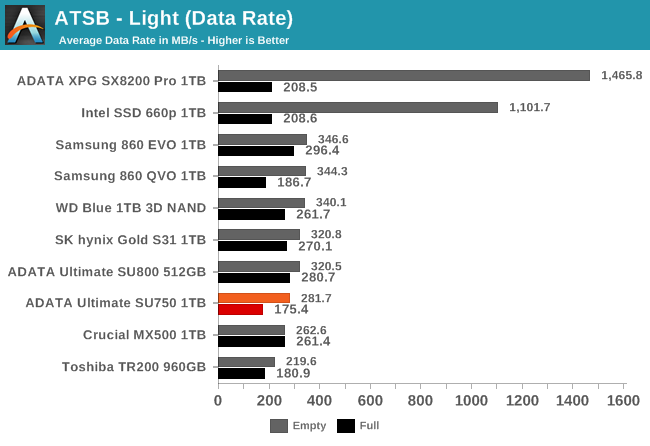
The ADATA Ultimate SU750 actually manages to outperform one of the mainstream SATA drives on the Light test, though that's more due to the Crucial MX500 misbehaving than the SU750 being fast. When the test is run on a full drive, the SU750 drops to last place, but isn't far behind the other two entry-level SATA drives.
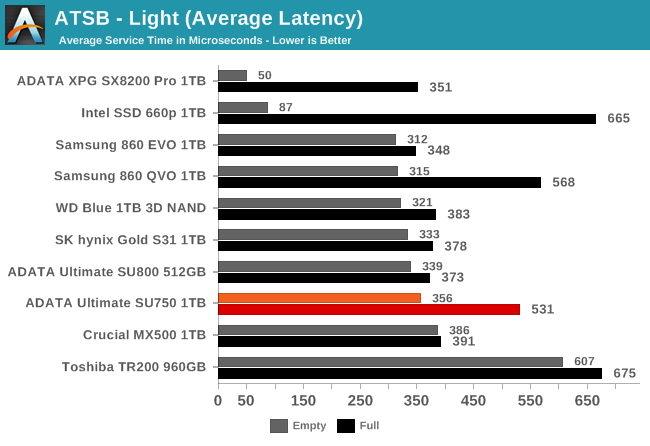
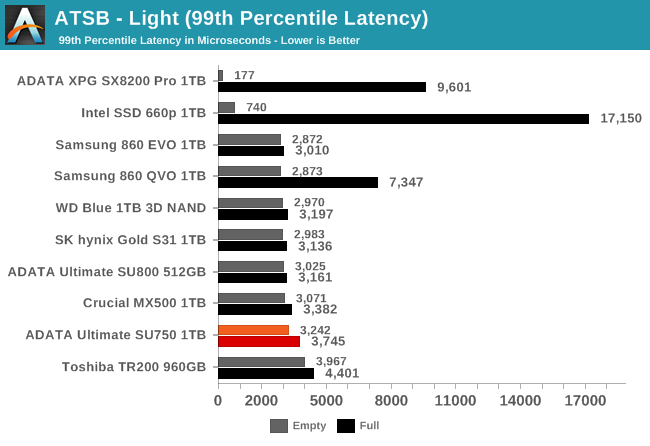
The average latency scores for the SU750 are fine when the Light test is run on an empty drive, and are at least better than the other entry-level drives for the full-drive test runs. The 99th percentile latency scores are similarly not too far behind mainstream SATA drives, and the full-drive latency doesn't have the QoS problems the Samsung 860 QVO experiences.
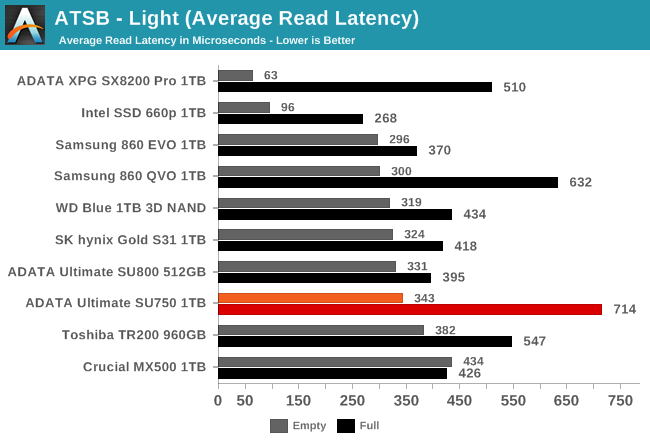
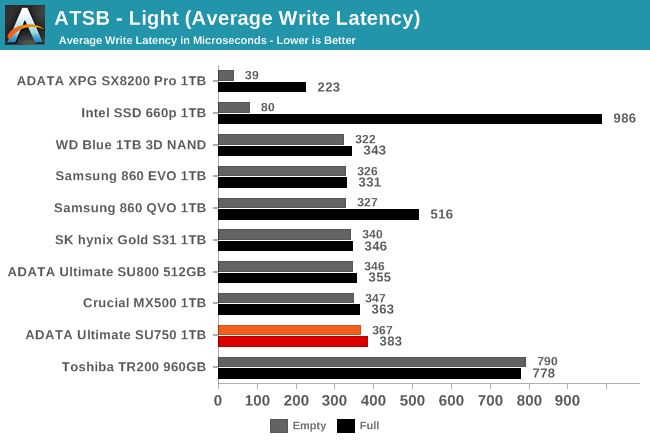
The SU750 has a bit of a problem with average read latency when the Light test is run on a full drive, but otherwise its average read and write latency scores are barely slower than typical mainstream SATA drives.
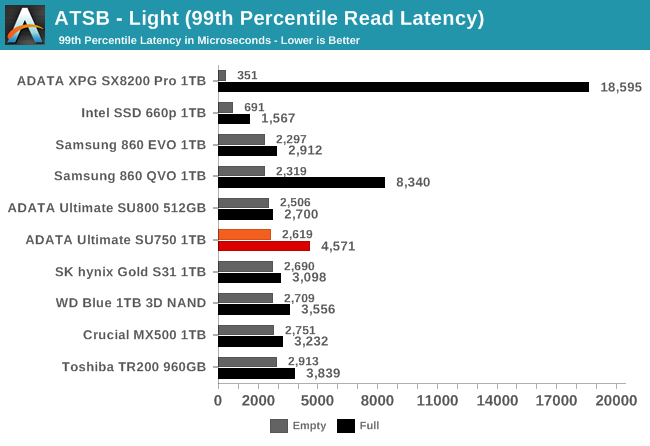
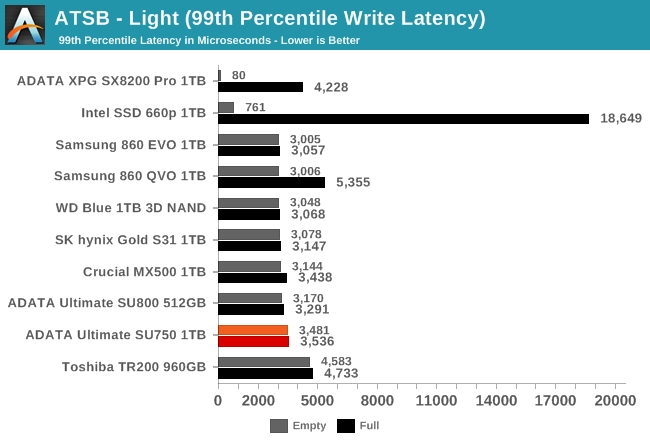
The 99th percentile read latency scores from the SU750 suffer a greater full-drive performance penalty than most other SATA drives experience, but nowhere near as bad as the 860 QVO. The SU750's 99th percentile write latency is fine for both empty and full drive test runs.
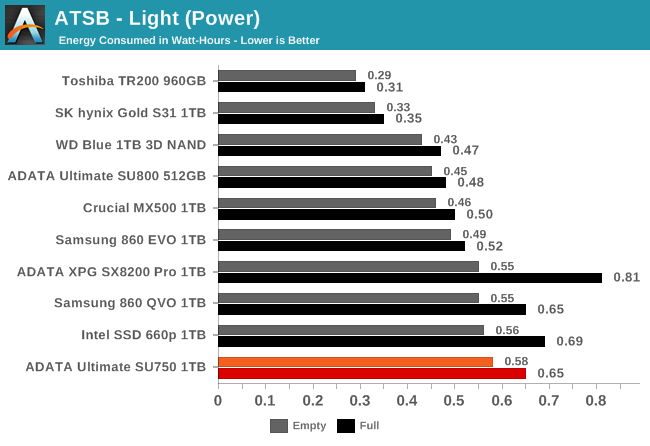
As usual, the SU750 has some of the highest energy usage scores, matched by the Samsung 860 QVO and the two NVMe drives. However, unlike the more difficult ATSB tests, the gap between the SU750 and the mainstream SATA drives is relatively small.










54 Comments
View All Comments
Samus - Sunday, December 8, 2019 - link
I didn't even want to bring up Killer XDdeil - Monday, December 9, 2019 - link
Well ONLY cards where I lost sound due to broken drivers is realteck. AND coincidentally ONLY network adapter that was supposed to do full gigabit, and stopped negotiation at 10 mbps was also realteck.they can do decent hardware, but soft from them is crappiest as possible.
HollyDOL - Saturday, December 7, 2019 - link
My 1st hand experience with Realtek dates back to Pentium 4 era. And it was so bad then I am still avoiding anything done by them in almost panic mode. Maybe they improved since then, but I am still not in state of mind to spend few $ to try.Gigaplex - Saturday, December 7, 2019 - link
Intel was terrible in the Pentium 4 era. Do you also avoid Intel in the same way?HollyDOL - Saturday, December 7, 2019 - link
Intel never had problems with functionality or output quality. For many scenarios you had better perf/$ on Athlons, but you didn't have problems having multiple computers on same network with Intel NIC having same MAC, lousy sound quality infested with noise or very low NIC performance.So no, I am not avoiding Intel same way since I never had remotely similar problems with them.
close - Saturday, December 7, 2019 - link
They weren't that bad. After building a neighborhood network (100Mbps and constantly saturated with Direct Connect P2P transfers) with thousands of clients (perhaps in the 5 figures or close to), 99.9% being Realtek network chipsets I'd say many of the issues are a bit overstated. Sure Intel was (is?) better but other than crappy support in Linux at that time, there was nothing out of the ordinary bad with Realtek. Not one MAC issue, not very low performance.I'm sure those thousands are not representative of all Realtek sales but I think there must also be some bias in there where the multitude of reports on forums makes you think it's an absolute rule that they were crap. Sound cards... dunno, had them on many PCs but rarely cared about the sound back in the day.
Samus - Sunday, December 8, 2019 - link
Terrible performance maybe. But Intel has always been fairly reliable. They've had a few minor chipset recalls, and the embarrassing, but very limited Pentium III recall, but on the whole they have traditionally had less errata than AMD and quite frankly their chipsets were always the gold-standard of PC's. Their network controllers are among the best in the world.PeachNCream - Friday, December 6, 2019 - link
ADATA has gotta get out of this town, out of this town and out of L.A. - with those prices. TRIM them to around $80 for 1TB and they will have a Solid pricing State to Drive sustained sales.bananaforscale - Friday, December 6, 2019 - link
Realtek does Dallas Semi?Lord of the Bored - Friday, December 6, 2019 - link
No, Maxim did Dallas Semiconduotor.